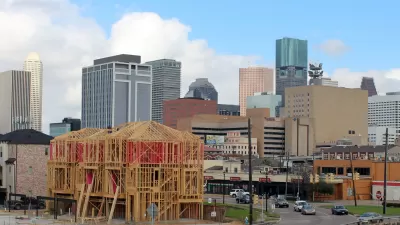Houston is famous in planning circles for lacking a zoning code, but that doesn't mean planners don't have plenty of tools to determine the future of the city.

William Fulton details the realities of land use in Houston, or, as Fulton describes it, "the largest city in the country with no zoning."
Houston is the fourth-largest city in America, with a population of 2.3 million people spread across more than 600 square miles. It contains some of the densest job centers and ritziest residential neighborhoods in the country. Yet three times in the last century — most recently in 1993 — Houstonians have voted down that most elemental of planning policies, zoning based on use. It's the first thing any planner — indeed, almost any person — asks about when they ask about Houston.
The key distinction Fulton teases out here, is that just because there is no zoning, doesn't mean there is also no planning in Houston. Houston has a frustrating development code, according to Fulton—and even zoning, in its own unique way.
"In reality, Houston is a big mixture of ordinances, policies, tactics by neighborhoods, and independent efforts by nonprofits, all of which play a role in determining how land is used," explains Fulton. "The city is rife with plans, strategies, and other efforts to create more walkability, bring new investment into historically underserved communities, and protect the city against future flooding and other hazards."
Fulton pinpoints planning in Houston to three key efforts, each with a lot more detail provided in the source article: 1) planning for the public realm, 2) planning tools for zoning workarounds, and 3) a market-driven development code.
FULL STORY: The 'Z' Word

Maui's Vacation Rental Debate Turns Ugly
Verbal attacks, misinformation campaigns and fistfights plague a high-stakes debate to convert thousands of vacation rentals into long-term housing.

Planetizen Federal Action Tracker
A weekly monitor of how Trump’s orders and actions are impacting planners and planning in America.

Chicago’s Ghost Rails
Just beneath the surface of the modern city lie the remnants of its expansive early 20th-century streetcar system.

Bend, Oregon Zoning Reforms Prioritize Small-Scale Housing
The city altered its zoning code to allow multi-family housing and eliminated parking mandates citywide.

Amtrak Cutting Jobs, Funding to High-Speed Rail
The agency plans to cut 10 percent of its workforce and has confirmed it will not fund new high-speed rail projects.

LA Denies Basic Services to Unhoused Residents
The city has repeatedly failed to respond to requests for trash pickup at encampment sites, and eliminated a program that provided mobile showers and toilets.
Urban Design for Planners 1: Software Tools
This six-course series explores essential urban design concepts using open source software and equips planners with the tools they need to participate fully in the urban design process.
Planning for Universal Design
Learn the tools for implementing Universal Design in planning regulations.
planning NEXT
Appalachian Highlands Housing Partners
Mpact (founded as Rail~Volution)
City of Camden Redevelopment Agency
City of Astoria
City of Portland
City of Laramie





























